新编实用英语综合教程二unit6shoppingandsightseeing
新编实用英语第二册课文译文 unit 6
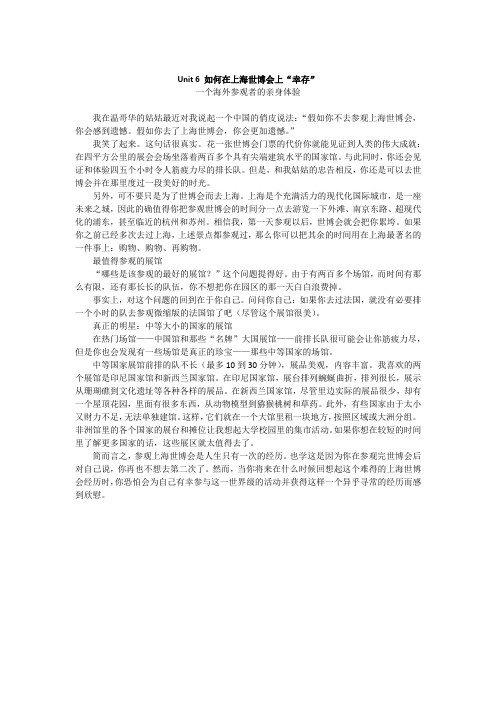
Unit 6 如何在上海世博会上“幸存”一个海外参观者的亲身体验我在温哥华的姑姑最近对我说起一个中国的俏皮说法:“假如你不去参观上海世博会,你会感到遗憾。
假如你去了上海世博会,你会更加遗憾。
”我笑了起来。
这句话很真实。
花一张世博会门票的代价你就能见证到人类的伟大成就:在四平方公里的展会会场坐落着两百多个具有尖端建筑水平的国家馆。
与此同时,你还会见证和体验四五个小时令人筋疲力尽的排长队。
但是,和我姑姑的忠告相反,你还是可以去世博会并在那里度过一段美好的时光。
另外,可不要只是为了世博会而去上海。
上海是个充满活力的现代化国际城市,是一座未来之城,因此的确值得你把参观世博会的时间分一点去游览一下外滩、南京东路、超现代化的浦东,甚至临近的杭州和苏州。
相信我,第一天参观以后,世博会就会把你累垮。
如果你之前已经多次去过上海,上述景点都参观过,那么你可以把其余的时间用在上海最著名的一件事上:购物、购物、再购物。
最值得参观的展馆“哪些是该参观的最好的展馆?”这个问题提得好。
由于有两百多个场馆,而时间有那么有限,还有那长长的队伍,你不想把你在园区的那一天白白浪费掉。
事实上,对这个问题的回到在于你自己。
问问你自己:如果你去过法国,就没有必要排一个小时的队去参观微缩版的法国馆了吧(尽管这个展馆很美)。
真正的明星:中等大小的国家的展馆在热门场馆——中国馆和那些“名牌”大国展馆——前排长队很可能会让你筋疲力尽,但是你也会发现有一些场馆是真正的珍宝——那些中等国家的场馆。
中等国家展馆前排的队不长(最多10到30分钟),展品美观,内容丰富。
我喜欢的两个展馆是印尼国家馆和新西兰国家馆。
在印尼国家馆,展台排列蜿蜒曲折,排列很长,展示从珊瑚礁到文化遗址等各种各样的展品。
在新西兰国家馆,尽管里边实际的展品很少,却有一个屋顶花园,里面有很多东西,从动物模型到猕猴桃树和草药。
此外,有些国家由于太小又财力不足,无法单独建馆。
这样,它们就在一个大馆里租一块地方,按照区域或大洲分组。
新编实用英语第二版2电子教案unit6PE2-U6-Session1
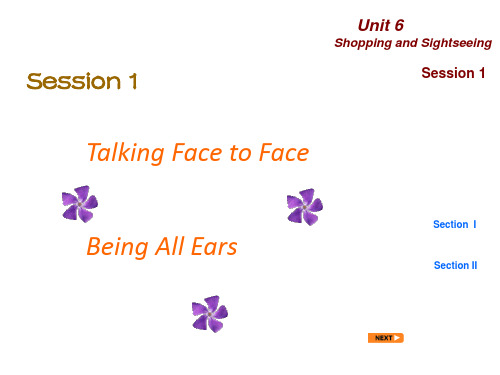
Session 1
Section I Section II
Lead in
Unit 6
Shopping and Sightseeing
Session 1
Section I Section II
Follow the Samples
Warm-up Questions Sample 1 Sample 2
Section I Section II
Lead in
Unit 6
Shopping and Sightseeing
Warm-up questions
Session 1
1. Do you like shopping?
2. Have you ever done shopping online? 3. Do you enjoy traveling? Why?
Paris or London? Julia: That’s hard to say. There were both good things and bad things
about the two cities. Peter: Wait a minute! What are the bad things? Julia: Traffic, for one. The traffic in Paris was pretty bad, and the traffic
in a dragon design background. Mr. Ahrens: How lovely it is! And so rich in color! (To the shop
assistant) How much does it cost? Shop assistant: Three thousand two hundred and fifty yuan. Mr. Ahrens: I think I’ll take it for my wife.
大学实用英语PE2-U6-Session3
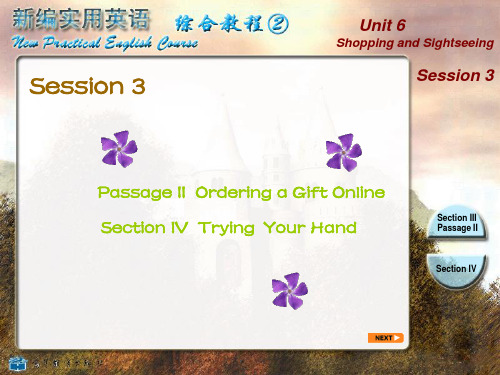
Session 3
Come to Canada
Canada is a friendly country that is close to home. You’ll arrive as a tourist, but you’ll leave as a friend. Ski on our snowy mountaintops and swim in our clear blue lakes. Enjoy the clean air of the country and the excitement of our cities. For more information, call your travel agent or Holiday, Inc. (800-324-4839) Reference
Section IV
Trying Your Hand
Applied Writing Grammar Review
Session 3
Section III Passage II
Sentence Writing
Section IV
Unit 6
Shopping and Sightseeing
Applied Writing
Section III Passage II
Section IV
Unit 6
Shopping and Sightseeing
Simulate and Create
Read the following travel ad and find out the details. Reference
Session 3
Session 3
Section III Passage II
汇编实用英语综合教学教育资料2Unit6ShoppingandSightseeing教案材料
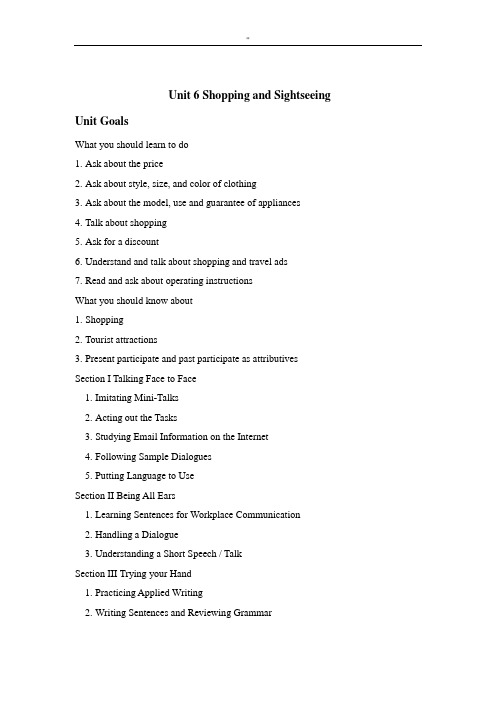
Unit 6 Shopping and Sightseeing Unit GoalsWhat you should learn to do1.Ask about the price2.Ask about style, size, and color of clothing3.Ask about the model, use and guarantee of appliances4.Talk about shopping5.Ask for a discount6.Understand and talk about shopping and travel ads7.Read and ask about operating instructionsWhat you should know about1.Shopping2.Tourist attractions3.Present participate and past participate as attributives Section I Talking Face to Face1.Imitating Mini-Talks2.Acting out the Tasks3.Studying Email Information on the Internet4.Following Sample Dialogues5.Putting Language to UseSection II Being All Ears1.Learning Sentences for Workplace Communication2.Handling a Dialogue3.Understanding a Short Speech / TalkSection III Trying your Hand1.Practicing Applied Writing2.Writing Sentences and Reviewing GrammarSection IV Maintaining a Sharp EyePassage 1 :Information Related to the Reading PassageFrom the first World Expo held in London in 1851, the World Expos have been held successively for many years. In 1933, World Expo Chicago set up its theme, and then the following expos also had their special themes.Text How I “Survived”the Shanghai ExpoAn Overseas Visitor’s Personal ExperienceMy aunt in Vancouver shared a wise Chinese saying after she came back from her trip to the Shanghai Expo:“If you didn’t go to the Shanghai Expo, you would regret it. If you did go to the Shanghai Expo, you would regret it even more.”I laughed. However, there was a lot of truth to the statement. For the price of an admission ticket to the Expo, you could get to witness a great human accomplishment: Over 200 architecturally cutting-edge national pavilions in a 4-km2 exhibition site. At the same time, you could get to witness and experience the exhausting 4 or 5 hours’long queuing lines.Believe me: the Expo itself would wear you out after Day One. In addition, you shouldn’t have come just to visit Shanghai for the Expo. Shanghai was a dynamic, modern, international city —the “city of the future”—and it is really worth breaking up your Expo visit with trips to the Bund, to Nanjing Road, to ultra-modern Pudong, maybe even to the neighboring cities: Hangzhou and Suzhou. And if you’d been to Shanghai many times already and seen all these sights, then you could use the rest of your time to do the one thing Shanghai was best known for: shopping, shopping, shopping.How I Chose The Best Pavilions to See“What were the best pavilions to see?”This was a good question. With over 200 pavilions and such limited time and such long lines, you wouldn’t want your day at the Expo site to go to waste.Actually, answering this question would start with yourself. If you’d been to France, there was no point waiting an hour to see the Fisher Price version of France in the French Pavilion (although still quite beautiful).The Real Stars I enjoyed most: mid-sized Countries pavilionsYou might be very much exhausted by queuing before the heavy hitters of the Expo —the China pavilion and the big “brand-name”countries —but you willalso discover that there are some real gems —mid-sized countries’pavilions.Mid-sized countries pavilions had short lines (10-30 minutes at most) and their displays could be quite beautiful and informative! Two that I enjoyed were: Indonesia and New Zealand. Indonesia had a long, snaking exhibit that showcased everything from coral reefs to ruins of culture. New Zealand, while short on the actual interior display, had a roof garden with everything from stuffed animals to Kiwi trees and herbs. Some countries were too small or poor to afford their own stand-alone pavilion. In that case, they rented space in a pavilion warehouse, usually grouped by region or continent. The Africa pavilion reminded me of a college activities fair, with booths and stands for individual countries. These places are also great if you were looking to learn more about a lot of countries in a short amount of time.Simply stated, the Shanghai Expo was a once-in-a-lifetime experience. Maybe it’s because, after visiting the Expo, you would probably tell yourself that you never want to do this again. But once you get to recall this rare Shanghai Expo experience sometime in the future, you will probably be happy that you had the chance to partake in such a world-class event and such an unusual experience.Language Points1 Explanation of Difficult Sentences1. (Para. 3) Shanghai is a dynamic, modern, international city —the “city of the future”—and it is really worth breaking up your Expo visit with trips to the Bund, to Nanjing East Road, to ultra-modern Pudong, maybe even to neighboring Hangzhou and Suzhou.Analysis: This is a long compound sentence, with several parallel phrases to …, to …, to …, even to …as attributives modifying the word trips.It is really worth breaking up your Expo visit means there is a good enough reason for visiting some other places except the Shanghai Expo. Translation: 上海是个充满活力的现代化的国际城市——“未来之城”,因此的确值得把你参观世博会的时间分一点去游览一下外滩、南京东路、超现代化的浦东,甚至临近的杭州和苏州。
综合教程2第二版unit6
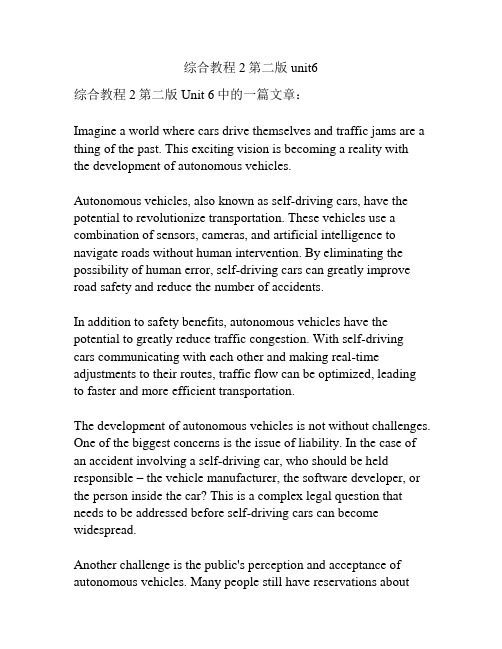
综合教程2第二版unit6综合教程2第二版Unit 6中的一篇文章:Imagine a world where cars drive themselves and traffic jams are a thing of the past. This exciting vision is becoming a reality with the development of autonomous vehicles.Autonomous vehicles, also known as self-driving cars, have the potential to revolutionize transportation. These vehicles use a combination of sensors, cameras, and artificial intelligence to navigate roads without human intervention. By eliminating the possibility of human error, self-driving cars can greatly improve road safety and reduce the number of accidents.In addition to safety benefits, autonomous vehicles have the potential to greatly reduce traffic congestion. With self-driving cars communicating with each other and making real-time adjustments to their routes, traffic flow can be optimized, leading to faster and more efficient transportation.The development of autonomous vehicles is not without challenges. One of the biggest concerns is the issue of liability. In the case of an accident involving a self-driving car, who should be held responsible – the vehicle manufacturer, the software developer, or the person inside the car? This is a complex legal question that needs to be addressed before self-driving cars can become widespread.Another challenge is the public's perception and acceptance of autonomous vehicles. Many people still have reservations abouttrusting a machine to make decisions while driving. Raising awareness and promoting the benefits of self-driving cars will be crucial in gaining public support.Despite these challenges, the potential benefits of autonomous vehicles are hard to ignore. With improved road safety, reduced traffic congestion, and increased accessibility for people with disabilities, self-driving cars have the potential to transform our transportation system and improve our quality of life.In conclusion, the development of autonomous vehicles holds great promise for the future. As technology continues to advance and public acceptance grows, self-driving cars may soon become a common sight on our roads. However, it is important to carefully address the legal and ethical questions that arise with this new technology. With proper regulations and public awareness, self-driving cars have the potential to bring about a safer and more efficient transportation system.。
新编实用英语综合教程2unit6课后练习答案
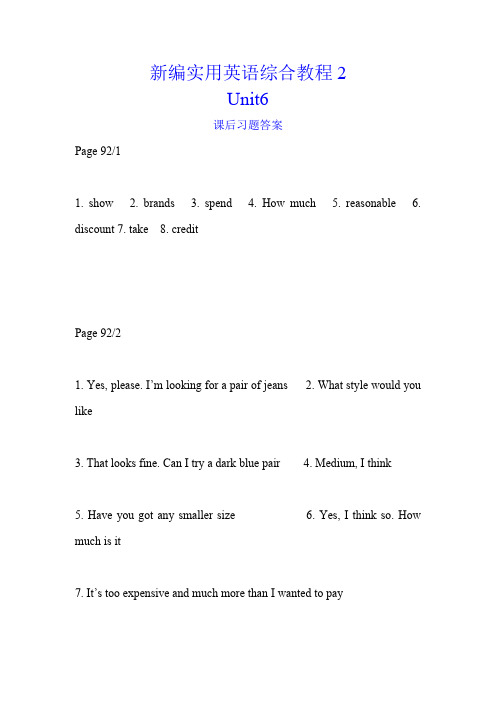
新编实用英语综合教程2Unit6课后习题答案Page 92/11. show2. brands3. spend4. How much5. reasonable6. discount7. take8. creditPage 92/21. Yes, please. I’m looking for a pair of jeans2. What style would you like3. That looks fine. Can I try a dark blue pair4. Medium, I think5. Have you got any smaller size6. Yes, I think so. How much is it7. It’s too expensive and much more than I wanted to pay8. Do you accept credit cardsPage 93/31. Linda, I’m going to visit Beijing this summer vacation.2. Have you been to Beijing? What is there to see in the ancient city?3. I do plan to see the Forbidden City first, and then the Summer Palace and the Temple of heaven.4. Climbing the Great Wall is what I have been dreaming of.5. I’ll be stay for a week.Section III Page 99/41. purchased2. accessible3. height4. have surpassed5. giant6.alternative7. tram 8. negotiate 9. upright 10. comfortPage 99/51. The artist carved a decoration out of this piece of wood.2. Her responsibilities consist of answering the phone and greeting visitors.3. A total of two hundred people visited the castle.4. The building is equipped with a gymnasium and a swimming pool.5. There are no tickets available for Saturday’s performance.Page 99/61. The dining-hall on the North campus is twice as large as that on the South.The streets in The Lake City are twice as wide as those in our city.2. The new overpass is 48 meters in width.The Indian Ocean measures 3900 meters in depth.3. Your study of English begins when you pay 50 dollars at the language school.Your visit to the Garden begins when you spend 4 dollars to buy a ticket at the front gate.4. The bus from the university to the shopping mall leaves every ten minutes.The train from Shaoguan to Guangzhou leaves every half an hour.5. These magazines cost two dollars each.They each signed the paper.6. Computers available in the central laboratory.Old books available on the fourth floor.Section IV.Page 104/21. d2. e3. h4. a5. c6. f7. i8. g9. bPage 105/3CanadafriendlySkiing on the snowy mountaintops, swimming in lakes, enjoying clean air and touring cities.Travel agent or Holiday, Inc. (800-324-4839)Page 106/61. The question discussed yesterday is of great importance.2. He is a well-behaved man.3. The established customs are difficult to change.4. The chairman read out a prepared statement.5. Children prefer the drink made of orange juice, sugar and water.6. He has to make a decision within a given period.7. We’ll discuss the plan put up by him at the next meeting.8. Do you know the girl singing on the stage?Page 106/7Mary Enjoys shopping in ChinaI have an American friend whose name is Mary. We often go shopping together. Mary enjoys shopping in China at big department stores. She likes wandering from one department to another, looking at the various articles on the counters, from umbrellas to gloves, from fancy goods to books, from clothes to shoes. Today, we are going to buy some stationery at the big stationery shop near our college. Mary needs some airmail envelopes, writing pads, and a couple of batteries for her walkman. I would like a bottle of glue, a box of paper clips, a stapler and two rolls of films. I enjoy going shopping with her because I can do something for her: I am her shopping guide.。
新编实用英语综合教程2unit6shoppingandsightseeing教案

Unit 6 Shopping and Sightseeing Unit GoalsWhat you should learn to do1.Ask about the price2.Ask about style, size, and color of clothing3.Ask about the model, use and guarantee of appliances4.Talk about shopping5.Ask for a discount6.Understand and talk about shopping and travel ads7.Read and ask about operating instructionsWhat you should know about1.Shopping2.Tourist attractions3.Present participate and past participate as attributives Section I Talking Face to Face1.Imitating Mini-Talks2.Acting out the Tasks3.Studying Email Information on the Internet4.Following Sample Dialogues5.Putting Language to UseSection II Being All Ears1.Learning Sentences for Workplace Communication2.Handling a Dialogue3.Understanding a Short Speech / TalkSection III Trying your Hand1.Practicing Applied Writing2.Writing Sentences and Reviewing GrammarSection IV Maintaining a Sharp EyePassage 1 :Information Related to the Reading PassageFrom the first World Expo held in London in 1851, the World Expos have been held successively for many years. In 1933, World Expo Chicago set up its theme, and then the following expos also had their special themes.Text How I “Survived”the Shanghai ExpoAn Overseas Visitor’s Personal ExperienceMy aunt in Vancouver shared a wise Chinese saying after she came back from her trip to the Shanghai Expo:“If you didn’t go to the Shanghai Expo, you would regret it. If you did go to the Shanghai Expo, you would regret it even more.”I laughed. However, there was a lot of truth to the statement. For the price of an admission ticket to the Expo, you could get to witness a great human accomplishment: Over 200 architecturally cutting-edge national pavilions in a 4-km2 exhibition site. At the same time, you could get to witness and experience the exhausting 4 or 5 hours’long queuing lines.Believe me: the Expo itself would wear you out after Day One. In addition, you shouldn’t have come just to visit Shanghai for the Expo. Shanghai was a dynamic, modern, international city —the “city of the future”—and it is really worth breaking up your Expo visit with trips to the Bund, to Nanjing Road, to ultra-modern Pudong, maybe even to the neighboring cities: Hangzhou and Suzhou. And if you’d been to Shanghai many times already and seen all these sights, then you could use the rest of your time to do the one thing Shanghai was best known for: shopping, shopping, shopping.How I Chose The Best Pavilions to See“What were the best pavilions to see?”This was a good question. With over 200 pavilions and such limited time and such long lines, you wouldn’t want your day at the Expo site to go to waste.Actually, answering this question would start with yourself. If you’d been to France, there was no point waiting an hour to see the Fisher Price version of France in the French Pavilion (although still quite beautiful).The Real Stars I enjoyed most: mid-sized Countries pavilionsYou might be very much exhausted by queuing before the heavy hitters of the Expo —the China pavilion and the big “brand-name”countries —but you willalso discover that there are some real gems —mid-sized countries’pavilions.Mid-sized countries pavilions had short lines (10-30 minutes at most) and their displays could be quite beautiful and informative! Two that I enjoyed were: Indonesia and New Zealand. Indonesia had a long, snaking exhibit that showcased everything from coral reefs to ruins of culture. New Zealand, while short on the actual interior display, had a roof garden with everything from stuffed animals to Kiwi trees and herbs. Some countries were too small or poor to afford their own stand-alone pavilion. In that case, they rented space in a pavilion warehouse, usually grouped by region or continent. The Africa pavilion reminded me of a college activities fair, with booths and stands for individual countries. These places are also great if you were looking to learn more about a lot of countries in a short amount of time.Simply stated, the Shanghai Expo was a once-in-a-lifetime experience. Maybe it’s because, after visiting the Expo, you would probably tell yourself that you never want to do this again. But once you get to recall this rare Shanghai Expo experience sometime in the future, you will probably be happy that you had the chance to partake in such a world-class event and such an unusual experience.Language Points1 Explanation of Difficult Sentences1. (Para. 3) Shanghai is a dynamic, modern, international city —the “city of the future”—and it is really worth breaking up your Expo visit with trips to the Bund, to Nanjing East Road, to ultra-modern Pudong, maybe even to neighboring Hangzhou and Suzhou.Analysis: This is a long compound sentence, with several parallel phrases to …, to …, to …, even to …as attributives modifying the word trips.It is really worth breaking up your Expo visit means there is a good enough reason for visiting some other places except the Shanghai Expo. Translation: 上海是个充满活力的现代化的国际城市——“未来之城”,因此的确值得把你参观世博会的时间分一点去游览一下外滩、南京东路、超现代化的浦东,甚至临近的杭州和苏州。
新编实用英语综合教程UnitShoppingandSightseeing教案
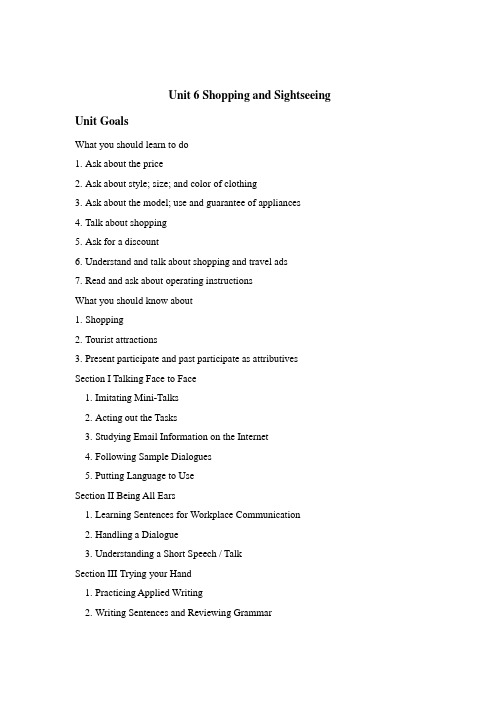
Unit 6 Shopping and Sightseeing Unit GoalsWhat you should learn to do1.Ask about the price2.Ask about style; size; and color of clothing3.Ask about the model; use and guarantee of appliances4.Talk about shopping5.Ask for a discount6.Understand and talk about shopping and travel ads7.Read and ask about operating instructionsWhat you should know about1.Shopping2.Tourist attractions3.Present participate and past participate as attributives Section I Talking Face to Face1.Imitating Mini-Talks2.Acting out the Tasks3.Studying Email Information on the Internet4.Following Sample Dialogues5.Putting Language to UseSection II Being All Ears1.Learning Sentences for Workplace Communication2.Handling a Dialogue3.Understanding a Short Speech / TalkSection III Trying your Hand1.Practicing Applied Writing2.Writing Sentences and Reviewing GrammarSection IV Maintaining a Sharp EyePassage 1 :Information Related to the Reading PassageFrom the first World Expo held in London in 1851; the World Expos have been held successively for many years. In 1933; World Expo Chicago set up its theme; and then the following expos also had their special themes.Text How I “Survived”the Shanghai ExpoAn Overseas Visitor’s Personal ExperienceMy aunt in Vancouver shared a wise Chinese saying after she came back from her trip to the Shanghai Expo:“If you didn’t go to the Shanghai Expo; you would regret it. If you did go to the Shanghai Expo; you would regret it even more.”I laughed. However; there was a lot of truth to the statement. For the price of an admission ticket to the Expo; you could get to witness a great human accomplishment: Over 200 architecturally cutting-edge national pavilions in a 4-km2 exhibition site. At the same time; you could get to witness and experience the exhausting 4 or 5 hours’long queuing lines.Believe me: the Expo itself would wear you out after Day One. In addition; you shouldn’t have come just to visit Shanghai for the Expo. Shanghai was a dynamic; modern; international city —the “city of the future”—and it is really worth breaking up your Expo visit with trips to the Bund; to Nanjing Road; to ultra-modern Pudong; maybe even to the neighboring cities: Hangzhou and Suzhou. And if you’d been to Shanghai many times already and seen all these sights; then you could use the rest of your time to do the one thing Shanghai was best known for: shopping; shopping; shopping.How I Chose The Best Pavilions to See“What were the best pavilions to see ”This was a good question. With over 200 pavilions and such limited time and such long lines; you wouldn’t want your day at the Expo site to go to waste.Actually; answering this question would start with yourself. If you’d been to France; there was no point waiting an hour to see the Fisher Price version of France in the French Pavilion although still quite beautiful.The Real Stars I enjoyed most: mid-sized Countries pavilionsYou might be very much exhausted by queuing before the heavy hitters of the Expo —the China pavilion and the big “brand-name”countries —but you will also discover that there are some real gems —mid-sized countries’pavilions.Mid-sized countries pavilions had short lines 10-30 minutes at most and their displays could be quite beautiful and informative Two that I enjoyed were: Indonesia and New Zealand. Indonesia had a long; snaking exhibit that showcased everything from coral reefs to ruins of culture. New Zealand; while short on the actual interior display; had a roof garden with everything from stuffed animals to Kiwi trees and herbs. Some countries were too small or poor to afford their own stand-alone pavilion. In that case; they rented space in a pavilion warehouse; usually grouped by region or continent. The Africa pavilion reminded me of a college activities fair; with booths and stands for individual countries. These places are also great if you were looking to learn more about a lot of countries in a short amount of time.Simply stated; the Shanghai Expo was a once-in-a-lifetime experience. Maybe it’s because; after visiting the Expo; you would probably tell yourself that you never want to do this again. But once you get to recall this rare Shanghai Expo experience sometime in the future; you will probably be happy that you had the chance to partake in such a world-class event and such an unusual experience.Language Points1 Explanation of Difficult Sentences1. Para. 3 Shanghai is a dynamic; modern; international city —the “city of the future”—and it is really worth breaking up your Expo visit with trips to the Bund; to Nanjing East Road; to ultra-modern Pudong; maybe even to neighboring Hangzhou and Suzhou.Analysis: This is a long compound sentence; with several parallel phrases to …; to …; to …; even to …as attributives modifying the word trips.It is really worth breaking up your Expo visit means there is a good enough reason for visiting some other places except the Shanghai Expo. Translation: 上海是个充满活力的现代化的国际城市——“未来之城”;因此的确值得把你参观世博会的时间分一点去游览一下外滩、南京东路、超现代化的浦东;甚至临近的杭州和苏州..Example: It’s well worth getting to the lecture early if you want a good seat.His proposal is really worth considering.2. Para. 3 And if you’ve been to Shanghai many times already and have seen all these sights; then use the rest of your time to do the one thing Shanghai is best known for: shopping; shopping; shopping.Analysis: This is a complex sentence; in which you can is omitted before the verb use in the main clause. And the relative clause the word which is omitted —which Shanghai is best known for modifies one thing; with shopping; shopping; shopping as the appositive to one thing.Translation: 如果你之前已经多次去过上海;上述景点都参观过;那么你可以把其余的时间用在上海最着名的一件事上:购物、购物、再购物..Example: The region is best known for its fine wines.This small town is best known for its handicraft products.3. Para. 5 If you’ve been to France; there’s no point waiting an hour to see theFisher-Price version of France in the French Pavilion although still quite beautiful.Analysis: Fisher-Price is a brand name of toys. Here it implies pocket size.There is no point doing sth. means there is no reason for doing something. Translation: 如果你以前去过法国;就没有必要排一个小时的队去参观微缩版的法国馆了尽管这个展馆很美..Example: I see no point in arguing over the details of the contract.Thank you. There’s no point in being surprised about it.4. Para. 7 New Zealand; while short on the actual interior display; had a roof garden with everything from stuffed animals to Kiwi trees and herbs.Analysis: while here means although; short on means having few.Translation: 在新西兰国家馆;尽管里边实际的展品很少;却有一个屋顶花园;里面有很多东西;从动物模型到猕猴桃树和草药..Example: While there was no conclusive evidence; most people thought he was guilty.While she is a likable girl; she can be extremely difficult to work with2 Important Words1. sharev. to divide or use sth. with others 分享e.g.Students were able to share their experiences.They meet to share secrets and relive old memories.2. regretv. to feel sorry about something you have done and wish you had notdone it 后悔e.g.If we don’t act now; we’ll regret it in the future.I’ve never regretted the decision.I’m going to regret eating all this food.3. sightsn. plural famous or interesting places that tourists visit 风景e.g.We enjoyed seeing the sights of San Francisco.In the afternoon; you’ll have a chance to relax or see the sights.4. experiencen. something that happens to you or something you do; especiallywhen this has an effect on what you feel or think 体验v. if you experience a problem; event; or situation; it happens to you or affects you 经历;体验e.g.This was my first experience of living with other people.Children need to experience things for themselves in order to learn from them.5. displayn. an arrangement of things for people to look at or buy 展品v. to show something to people; or put it in a place where people can see it easily 展示e.g.The window display caught her eye.Local train and bus timetables are displayed in the station.6. informativea. providing many useful facts or ideas 提供大量资料的e.g.This is really an informative and entertaining book.The engineer’s lecture was very informative.7. recallv. to remember a particular fact; event; or situation from the past 回想起e.g.I seem to recall I’ve met him somewhere before.I can’t recall who gave me the information.8. fairn. an event at which people or businesses show and sell their products 商品展览会;集市e.g.a trade fair where companies show their newest productsa craft fair where people sell handmade products such as jewellery;paintings; etc.Passage 2 :Information Related to the Reading PassageYiwu is a city with a population of over 2 million people and is located in Zhejiang Province. Yiwu is about 100 km south of Hangzhou. Its GDP was 52 billion Yuan in 2009 and the per capita GDP over US$10;000. A World Bank report describes Yiwu like this: “Yiwu; 300 kilometers away from Shanghai; is the largest market of petty commodity wholesales in the world where various foreign buyers go to place orders.”Text Yiwu; a Mega Market for Small CommoditiesMeasuring around 1;100 square kilometers; almost the size of Hong Kong; Yiwu seems just like another ordinary small inland city in eastern China. However; in the past two decades; the city has grown into a mega market that is attracting attention from all over the world.Every day; over 1;000 TEU Twenty-foot Equivalent Unit containers of products are sent from Yiwu to around 200 countries and regions. In the first half of this year; the city saw over 800 million US dollars in trade volume.With the fame of Yiwu as a mega market for small commodities growing globally; more and more foreign businessmen are flooding into the city. While searching for good business here; they also brought opportunities and fortune to the city.As foreign businessmen have become an important part of the city’s economy and social life; Yiwu is embracing more and more newcomers of different nationalities and diverse cultures. Some foreigners choose Yiwu to start their career and the city has become their home outside their motherland.Azimi from Afghanistan arrived in Yiwu to start his business after he graduatedas an overseas student in Beijing. Just like some other foreign businessmen in the city; now he owns a trade company here and speaks fluent Chinese. However; two years ago; Yiwu was somewhere he had never heard of.“I came to Yiwu in 2001 for the first time; when my cousin told me that there was a city in China called Yiwu; which sounds like YOU; and I had no idea where it was.”During his first visit to Yiwu; Azimi saw the early phase of the small commodity market there; which impressed him a lot. After he finished his studies; he finally decided to start his career in Yiwu; and the fast development of the city has brought big profits to him. At the beginning; Azimi planned to stay in Yiwu for a year to earn some extra money before continuing his study; but he had to change the plan later.“Now I’ve decided to continue my stay in Yiwu; because my business is going quite well; which is out of my expectation.”Now; Azimi’s company sells various products for daily use from Yiwu to many other countries; including the U.S. and European countries. As for many other foreign businessmen in the city; Yiwu has now become what their lives and careers are all about.Pushed by the integration of different cultures; the small inland city is turning into the foreland of globalization. People with different backgrounds gather here and try hard to realize their business dreams. They profit from the city’s development; and also fuel the future development of the city.Language Points1 Explanation of Difficult Sentences1. Para. 3 While searching for good business here; they also brought opportunities and fortune to the city.Analysis: while here means at the same time when something is happening. In this clause; they are has been omitted.Translation: 他们在义乌寻找良好的商机的同时;也为这座城市带来了机遇和财富..Example: She met Andy while working for the production department of Carmen.I bought a magazine while waiting for the train.2. Para. 5 …however; two years ago; Yiwu was somewhere he had never heard of. Analysis: Be had never heard of is a relative clause with that omitted; modifying somewhere.Translation: 然而;两年前义乌却是一个他从没听说过的地方..Example: It’s odd that I haven’t heard of you.I’ve heard of a job which would be just right for you.3. Para. 7 During his first visit to Yiwu; Azimi saw the early phase of the small commodity market there; which impressed him a lot.Analysis: which impressed him a lot is a relative clause; which refers to the whole clause before it. This clause is used to add more information about the event just mentionedTranslation: 当第一次来到义乌时;阿兹米看到的是这个小商品市场的早期状况;这给他留下了深刻印象..Example: A skilled workforce is essential; which is why our training program is so successful.Bogart starred in the film Casablanca; which was made in 1942.4. Para.9 As for many other foreign businessmen in the city; Yiwu has now become what their lives and careers are all about.Analysis: what their lives and careers are all about is a subject complement clause. Translation: 至于城里的许多其他外国商人;义乌现在已经成为他们生活和事业的全部..Example: I could get you a job here if that’s what you want.Peter always does his best; and that’s what I like about him.2 Important Words1. growv. to increase in amount; size; number; or strength 发展;增长e.g.In the early part of the century; our foreign trade grew steadily.He has spent the past seven years growing his business.2. search forto try to find someone or something by looking very carefully 找寻e.g.I’ve searched high and low for my glasses.A plane was sent to search for the missing tourists.3. floodv. to arrive or go somewhere in large numbers 蜂拥而至n. a very large amount of water that covers an area that is usually dry 洪水e.g.Donations have been flooding in since we launched the appeal.The village was cut off by floods.4. hear ofto find out that something has happened 听说e.g.I was shocked to hear of his death.This was the first time that I’d heard of any trouble in the area.5. expectationn. the belief that something will happen 预料;预期e.g.The team set off without any expectation of success.Gina has succeeded beyond our expectation.6. impressv. to make someone admire and respect 留下印象e.g.We were very impressed by the standard of work.One candidate in particular impressed us with her knowledge.7. profitn. money that you gain by selling things or doing business after your costs have been paid 利润v. to get advantage or benefit from doing something 收益e.g.All the profits from the auction will go to cancer research.Some industries; such as shipbuilding; clearly profited from the war.。
新编实用英语综合教程2
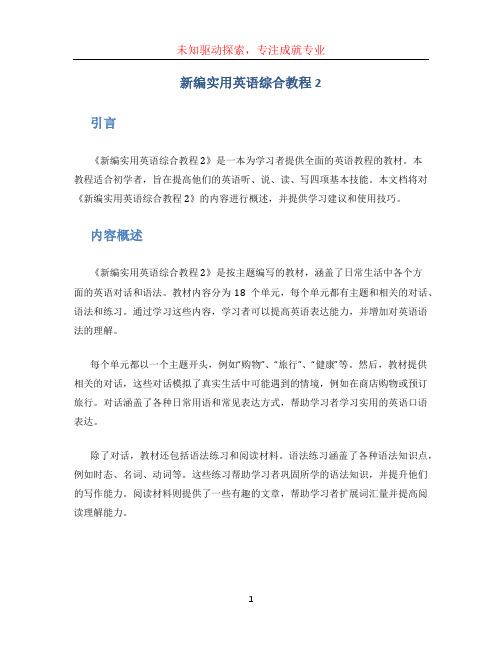
新编实用英语综合教程2引言《新编实用英语综合教程2》是一本为学习者提供全面的英语教程的教材。
本教程适合初学者,旨在提高他们的英语听、说、读、写四项基本技能。
本文档将对《新编实用英语综合教程2》的内容进行概述,并提供学习建议和使用技巧。
内容概述《新编实用英语综合教程2》是按主题编写的教材,涵盖了日常生活中各个方面的英语对话和语法。
教材内容分为18个单元,每个单元都有主题和相关的对话、语法和练习。
通过学习这些内容,学习者可以提高英语表达能力,并增加对英语语法的理解。
每个单元都以一个主题开头,例如“购物”、“旅行”、“健康”等。
然后,教材提供相关的对话,这些对话模拟了真实生活中可能遇到的情境,例如在商店购物或预订旅行。
对话涵盖了各种日常用语和常见表达方式,帮助学习者学习实用的英语口语表达。
除了对话,教材还包括语法练习和阅读材料。
语法练习涵盖了各种语法知识点,例如时态、名词、动词等。
这些练习帮助学习者巩固所学的语法知识,并提升他们的写作能力。
阅读材料则提供了一些有趣的文章,帮助学习者扩展词汇量并提高阅读理解能力。
学习建议•阅读对话:在学习每个单元时,首先阅读相关的对话。
尝试理解对话中使用的词汇和句型,并注意语音、语调和语气。
可以通过反复阅读对话来加深理解。
•学习语法:每个单元都包含语法练习,建议在阅读对话后先完成语法练习。
通过练习,巩固所学的语法知识,并在实际应用中提升自己的英语写作能力。
•扩展词汇:在阅读材料中,注意新词汇的学习。
每个单元都会提供一些生词和词组,建议将其记录下来并逐渐扩展自己的词汇量。
•口语练习:尝试模仿对话中的语音、语调和语气,并进行口头练习。
可以与同学或语伴进行对话练习,提高自己的口语表达能力。
使用技巧•利用语音资源:本教材配有语音资源,可以通过扫描二维码或使用电子设备进行访问。
学习者可以通过听取对话来提高听力和语音表达能力。
可以反复听取对话,并模仿语音和语调。
•创造情境:在学习对话时,可以尝试将对话中的情境创造出来。
新编实用英语综合教程2Unit6ShoppingandSightseeing教案

Unit 6 Shopping and SightseeingUnit GoalsWhat you should learn to do1. Ask about the price2. Ask about style, size, and color of clothing3. Ask about the model, use and guarantee of appliances4. Talk about shopping5. Ask for a discount6. Understand and talk about shopping and travel ads7. Read and ask about operating instructionsWhat you should know about1. Shopping2. Tourist attractions3. Present participate and past participate as attributives Section I Talking Face to Face1. Imitating Mini-Talks2. Acting out the Tasks3. Studying Email Information on the Internet4. Following Sample Dialogues5. Putting Language to UseSection II Being All Ears1. Learning Sentences for Workplace Communication2. Handling a Dialogue3. Understanding a Short Speech / TalkSection III Trying your Hand1. Practicing Applied Writing2. Writing Sentences and Reviewing GrammarSectio n IV Mai ntai ning a Sharp EyePassage 1 :Information Related to the Reading PassageFrom the first World Expo held in London in 1851, the World Expos have bee n held successively for many years. In 1933, World Expo Chicago set up its theme, and then the following expos also had their special themes.Text How I “Survived” the Shanghai ExpoAn Overseas Visitor's Personal ExperienceMy aunt in Vancouver shared a wise Chinese saying after she came back from her trip to the Shanghai Expo:“ If you didn't go to the Shanghai Expo, you would regret it. If you did go to the Shanghai Expo, you would regret it even more”.I laughed. However, there was a lot of truth to the statement. For the price of an admission ticket to the Expo, you could get to witness a great human accomplishment: Over 200 architecturally cutting-edge national pavilions in a 4-km2 exhibition site. At the same time, you could get to witness and experience the exhausting 4 or 5 hou'rs long queuing lines.Believe me: the Expo itself would wear you out after Day One. In addition, you shouldn't have come just to visit Shanghai for the Expo. Shanghai was a dynamic, modern, international city —the “ city of the future” —and it is really worth breaking up your Expo visit with trips to the Bund, to Nanjing Road, to ultra-modern Pudong, maybe even to the neighboring cities: Hangzhou and Suzhou. And if you'd been to Shanghai many times already and seen all these sights, then you could use the rest of your time to do the one thing Shanghai was best known for: shopping, shopping, shopping.How I Chose The Best Pavilions to See“What were the best pavilions to see?” This was a good question. With over 200 pavilions and such limited time and such long lines, you wouldn't want your day at the Expo site to go to waste.Actually, answering this question would start with yourself. If you'd been to France, there was no point waiting an hour to see the Fisher Price version of France in the French Pavilion (although still quite beautiful).The Real Stars I enjoyed most: mid-sized Countries pavilionsYou might be very much exhausted by queuing before the heavy hitters of theExpo —the China pavilion and the big “ brand-name” countries —but you will also discover that there are some real gems—mid-sized countries' pavilions. Mid-sized countries pavilions had short lines (10-30 minutes at most) and their displays could be quite beautiful and informative! Two that I enjoyed were: Indonesia and New Zealand. Indonesia had a long, snaking exhibit that showcased everything from coral reefs to ruins of culture. New Zealand, while short on the actual interior display, had a roof garden with everything from stuffed animals to Kiwi trees and herbs. Some countries were too small or poor to afford their own stand-alone pavilion. In that case, they rented space in a pavilion warehouse, usually grouped by region or continent. The Africa pavilion reminded me of a college activities fair, with booths and stands for individual countries. These places are also great if you were looking to learn more about a lot of countries in a short amount of time.Simply stated, the Shanghai Expo was a once-in-a-lifetime experience. Maybe it 's because, after visiting the Expo, you would probably tell yourself that you never want to do this again. But once you get to recall this rare Shanghai Expo experience sometime in the future, you will probably be happy that you had the chance to partake in such a world-class event and such an unusual experience.Language Points1 Explanation of Difficult Sentences1. (Para. 3) Shanghai is a dynamic, modern, international city —the “ city of the future” —and it is really worth breaking up your Expo visit with trips to the Bund, to Nanjing East Road, to ultra-modern Pudong, maybe even to neighboring Hangzhou and Suzhou.Analysis: This is a long compound sentence, with several parallel phrases to , , to , ,to , , even to , as attributives modifying the word trips.It is really worth breaking up your Expo visit means there is a good enough reason for visiting some other places except the Shanghai Expo. Translation: 上海是个充满活力的现代化的国际城市——“未来之城” ,因此的确值得把你参观世博会的时间分一点去游览一下外滩、南京东路、超现代化的浦东,甚至临近的杭州和苏州。
新编实用英语综合教程二Unit-6-Shopping-and-Sightseeing购物与观光

Unit | Six
Unit | Six
We can enjoy the nature
Unit | Six
2. What questions do you often ask in going sightseeing?
How long will it take us to get there?
1. Ask about the price 2. Ask about style, size and color of clothing 3. Ask about the model, use and guarantee of appliances 4. Talk about shopping 5. Ask for a discount 6. Understand and talking about shopping and travel ads 7. Read and ask about operating instructions
新编实用英语综合教程2unit6课后练习答案
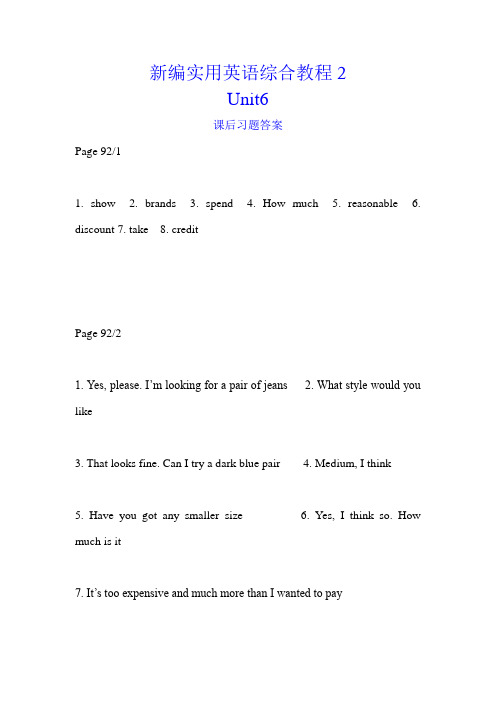
新编实用英语综合教程2Unit6课后习题答案Page 92/11. show2. brands3. spend4. How much5. reasonable6. discount7. take8. creditPage 92/21. Yes, please. I’m looking for a pair of jeans2. What style would you like3. That looks fine. Can I try a dark blue pair4. Medium, I think5. Have you got any smaller size6. Yes, I think so. How much is it7. It’s too expensive and much more than I wanted to pay8. Do you accept credit cardsPage 93/31. Linda, I’m going to visit Beijing t his summer vacation.2. Have you been to Beijing? What is there to see in the ancient city?3. I do plan to see the Forbidden City first, and then the Summer Palace and the Temple of heaven.4. Climbing the Great Wall is what I have been dreaming of.5. I’ll be stay for a week.Section III Page 99/41. purchased2. accessible3. height4. have surpassed5. giant6.alternative7. tram 8. negotiate 9. upright 10. comfortPage 99/51. The artist carved a decoration out of this piece of wood.2. Her responsibilities consist of answering the phone and greeting visitors.3. A total of two hundred people visited the castle.4. The building is equipped with a gymnasium and a swimming pool.5. There are no tickets available for Saturday’s performance.Page 99/61. The dining-hall on the North campus is twice as large as that on the South.The streets in The Lake City are twice as wide as those in our city.2. The new overpass is 48 meters in width.The Indian Ocean measures 3900 meters in depth.3. Your study of English begins when you pay 50 dollars at the language school.Your visit to the Garden begins when you spend 4 dollars to buy a ticket at the front gate.4. The bus from the university to the shopping mall leaves every ten minutes.The train from Shaoguan to Guangzhou leaves every half an hour.5. These magazines cost two dollars each.They each signed the paper.6. Computers available in the central laboratory.Old books available on the fourth floor.Section IV.Page 104/21. d2. e3. h4. a5. c6. f7. i8. g9. bPage 105/3CanadafriendlySkiing on the snowy mountaintops, swimming in lakes, enjoying clean air and touring cities.Travel agent or Holiday, Inc. (800-324-4839)Page 106/61. The question discussed yesterday is of great importance.2. He is a well-behaved man.3. The established customs are difficult to change.4. The chairman read out a prepared statement.5. Children prefer the drink made of orange juice, sugar and water.6. He has to make a decision within a given period.7. We’ll discuss the plan put up by him at the next meeting.8. Do you know the girl singing on the stage?Page 106/7Mary Enjoys shopping in ChinaI have an American friend whose name is Mary. We often go shopping together. Mary enjoys shopping in China at big department stores. She likes wandering from one department to another, looking at the various articles on the counters, from umbrellas to gloves, from fancy goods to books, from clothes to shoes. Today, we are going to buy some stationery at the big stationery shop near our college. Mary needs some airmail envelopes, writing pads, and a couple of batteries for her walkman. I would like a bottle of glue, a box of paper clips, a stapler and two rolls of films. I enjoy going shopping with her because I can do something for her: I am her shopping guide.。
新编第二册第六单元教案.docx

Unit6 shopping and sightseeingTeaching Aims: 1. key words and expressions2.how to communicate about shopping and sightseeingTeaching Method: Audio-lingual methodsTeaching Aids: Multi一media BlackboardTeaching Focus: how to communicate about shopping and sightseeing.Teaching Process:(homework of last period: introduce a foreign friend abou the most attractive place in Shi Jiazhuang)Warming-up :1.Which do you like better, shopping and sightseeing and why?(give students afew munites to think and give their answers and explanation)2.Their dialogue of homework3.Teacher points out the highlights of their dialogue as well as the mistakes theymade.4.Ask them to see how native speakers to express in the same situation.Sample dialogue:1.The students practice the dialogue in groups.2.The students role-play the similar situations of communication they havecreated to the class3.Let,s learn more related dialogues while listening(ask them to try their best to fill out those blanks):4.The students do the put in use exercises in groups by compitation.(Each group gives their answers on the blackboard)Homework:1.reviwe the new words and expressions2.prepare for the new lession.Blackboard Design:Answers for those exercises:ReflectionTeaching Aims: 1. key words and expressions2.listening abilityTeaching Method: task-based approuchTeaching Aids: Multi一media BlackboardTeaching Focus: Practice students,listening abilityTeaching Process:(the whole exercises on this section will be used as compitation materials and after the compitation, teacher will award the team- winner)1.Cive the students a few minutes to read through the written materials for eachlistening item.2.The students listen to the tape for three times3.Each team collects their answers and ask someone write down on the blackboard4.Do all the exercises in the same way.Homeworks:1.prepare for passage IBlackboard Design:Answers for those exercises:ReflectionTeaching Aims:1.key words and expressions2.know the way to describe the tourist attractions3.reading abilityTeaching Method: trodational lecture methodTeaching Aids: Multi一media BlackboardTeaching Focus: Practice students? reading abilityTeaching Process:New Words learning(by giving their 5 minutes to resite and check by giving pictures to help them to remmber)Leading in:Introduce to the students the Gateway arch by picturesWarm up1.What do you know about America's mountains and famous buildings?2.What is the tallest man-made monument in the Western Hemisphere? Presentation:1.Class discussion:QI: What can we learn from the first paragragh?Q2: How high is the Gateway Arch?Q3: How can we get to the top of the Gateway Arch?Q4: Where can you get a tram ticket?Q5: How many days do the arch trams run every week?2.Teacher anlyze the passage.Practice:Do all the exercises of this sectionHomeworks:Resite all the new wordsWrite a short passage about one tourist attraction in you hometown Blackboard Design:The new words Answers for those exercises:ReflectionTeaching Aims:1.words and expressions of the instructions2.present participle and past participle as attributivesTeaching Method: trodational lecture methodTeaching Aids: Multi一media BlackboardTeaching Focus: present participle and past participle as attributivesTeaching Process:Applied writing:1.Sample analysis:The teacher makes the following brief analysis of the format and the language used in Instructions.The teacher may take Sample 1 as an example for the analysis and asks the students the following questions:(1). What is the model of the product?(2). What features does the player have?(3). What are the dimensions and weight of the player?(4). How large is the memory of the player?(5). What comes with the player?2.Teacher give the language features.3.The students do the Simulate and Create exercises.Grammar review1.The teacher gives a brief account of the basic usage of Prexent participle and pastparticiple as attributives.2.The students do Exercises5.6and 7 in class or after class.Homeworks:Do the grammar exercises in the workbook■Blackboard Design:Grammars:Reflection。
